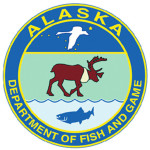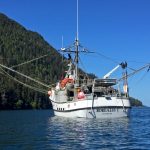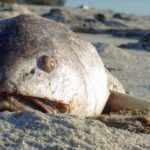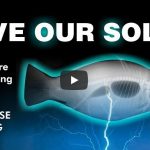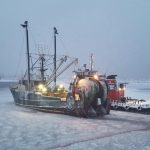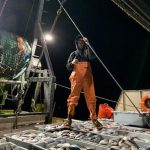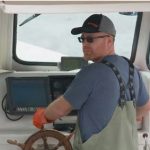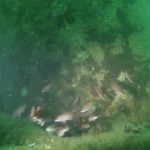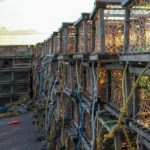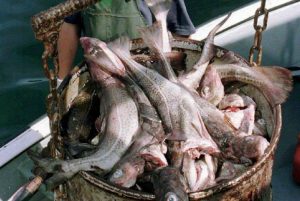Tag Archives: salmon bycatch
Fishery managers start a process to tighten salmon bycatch rules in Alaska’s Bering Sea
 Federal fishery managers took steps on Tuesday to impose new rules to prevent Alaska chum salmon from being scooped into nets used to catch Bering Sea pollock, an industrial-scale fishery that makes up the nation’s largest single-species commercial seafood harvest. The North Pacific Fishery Management Council advanced a suite of new protections intended to combat the pollock trawlers’ salmon bycatch, the term for the incidental catch of unintended species. Proposed steps in the package include numeric caps on total chum salmon bycatch, with varying allocations for different sectors of the pollock fleet; protective limits in corridors known to be used by salmon migrating through the ocean back to Western Alaska freshwater spawning areas; and provisions that would link new limits in the ocean to real-time salmon counts and conditions in the rivers. more, >>CLICK TO READ<< 12:31
Federal fishery managers took steps on Tuesday to impose new rules to prevent Alaska chum salmon from being scooped into nets used to catch Bering Sea pollock, an industrial-scale fishery that makes up the nation’s largest single-species commercial seafood harvest. The North Pacific Fishery Management Council advanced a suite of new protections intended to combat the pollock trawlers’ salmon bycatch, the term for the incidental catch of unintended species. Proposed steps in the package include numeric caps on total chum salmon bycatch, with varying allocations for different sectors of the pollock fleet; protective limits in corridors known to be used by salmon migrating through the ocean back to Western Alaska freshwater spawning areas; and provisions that would link new limits in the ocean to real-time salmon counts and conditions in the rivers. more, >>CLICK TO READ<< 12:31
Board of Fisheries says all salmon bycatch from one pollock trawl fishery must be retained
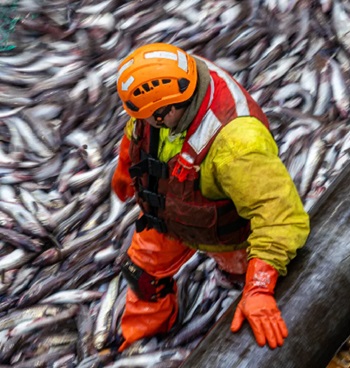 Alaska’s Board of Fisheries considered four proposals that would have severely restricted or even shut down the pollock trawl fishery in Prince William Sound. Ultimately, though, only one was passed that didn’t go nearly that far. The amended version of Proposal 15, which was changed by Board member Tom Carpenter, was approved six to one. Proposals 14 and 16 had no action taken based on #15 passing, and proposal 17 failed with only one member in favor. The measure stipulates that all salmon bycatch must be brought back to port and surrendered to the Alaska Department of Fish & Game, also referred to as mandatory retention. This would add on to the mandatory retention that is already required for rockfish and potentially address some of the salmon bycatch concerns in the trawl fishery. links, more, >>CLICK TO READ<< 14:31
Alaska’s Board of Fisheries considered four proposals that would have severely restricted or even shut down the pollock trawl fishery in Prince William Sound. Ultimately, though, only one was passed that didn’t go nearly that far. The amended version of Proposal 15, which was changed by Board member Tom Carpenter, was approved six to one. Proposals 14 and 16 had no action taken based on #15 passing, and proposal 17 failed with only one member in favor. The measure stipulates that all salmon bycatch must be brought back to port and surrendered to the Alaska Department of Fish & Game, also referred to as mandatory retention. This would add on to the mandatory retention that is already required for rockfish and potentially address some of the salmon bycatch concerns in the trawl fishery. links, more, >>CLICK TO READ<< 14:31
Big fight looms at Board of Fish meeting over Prince William Sound trawl bycatch
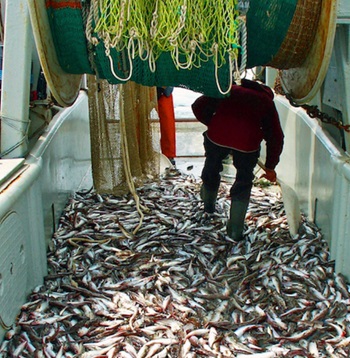 For years, conservationists, tribes and fishermen have feuded over bycatch of salmon in the huge pollock harvest in the remote Bering Sea off Alaska. Now, a new bycatch fight has erupted over a much smaller pollock fishery not far from urban Alaska, in the waters of Prince William Sound, east of Anchorage. This week, the state Board of Fisheries is considering four proposals by a local tribal government and an Alaska sportsmen’s group that could place sharp restrictions on, or even close down, Prince Williams Sound’s annual pollock trawl harvest. Supporters of the proposals cite state data that show the roughly 15 participating boats, most of which come from Kodiak Island, unintentionally scoop up some 900 king salmon and 900 rockfish each year in their wide-mouth trawl nets. And they say that subsistence harvests of those fish need protection. more, >>CLICK TO READ<< 12:07
For years, conservationists, tribes and fishermen have feuded over bycatch of salmon in the huge pollock harvest in the remote Bering Sea off Alaska. Now, a new bycatch fight has erupted over a much smaller pollock fishery not far from urban Alaska, in the waters of Prince William Sound, east of Anchorage. This week, the state Board of Fisheries is considering four proposals by a local tribal government and an Alaska sportsmen’s group that could place sharp restrictions on, or even close down, Prince Williams Sound’s annual pollock trawl harvest. Supporters of the proposals cite state data that show the roughly 15 participating boats, most of which come from Kodiak Island, unintentionally scoop up some 900 king salmon and 900 rockfish each year in their wide-mouth trawl nets. And they say that subsistence harvests of those fish need protection. more, >>CLICK TO READ<< 12:07
Western Alaska tribes, outraged by bycatch, turn up the heat on fishery managers and trawlers
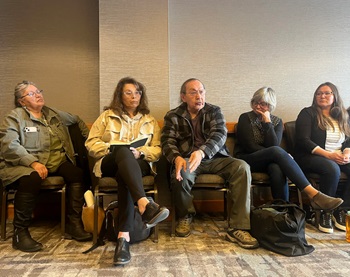 Earlier this spring, Maurice McGinty, a tribal leader from the village of Nulato, pulled out his last mason jar of smoked Yukon king. “We have no more now,” said McGinty, 80. He added: “They are pushing us, and our traditional way of life, into a hole.” Imagine hearing and reading versions of McGinty’s story dozens of times, told by Indigenous people who live along the Yukon and another iconic subsistence river in Southwest Alaska, the Kuskokwim. That’s the reality this week for the policymakers on the North Pacific Fishery Management Council, the federal commission that regulates commercial fishing in the American waters of the Bering Sea. On one side are tribal leaders from the Yukon and Kuskokwim, On the other side are representatives for the trawlers, more, >>click to read<< 13:51
Earlier this spring, Maurice McGinty, a tribal leader from the village of Nulato, pulled out his last mason jar of smoked Yukon king. “We have no more now,” said McGinty, 80. He added: “They are pushing us, and our traditional way of life, into a hole.” Imagine hearing and reading versions of McGinty’s story dozens of times, told by Indigenous people who live along the Yukon and another iconic subsistence river in Southwest Alaska, the Kuskokwim. That’s the reality this week for the policymakers on the North Pacific Fishery Management Council, the federal commission that regulates commercial fishing in the American waters of the Bering Sea. On one side are tribal leaders from the Yukon and Kuskokwim, On the other side are representatives for the trawlers, more, >>click to read<< 13:51
With little movement on salmon bycatch, Alaska advocates look to Biden administration for executive action
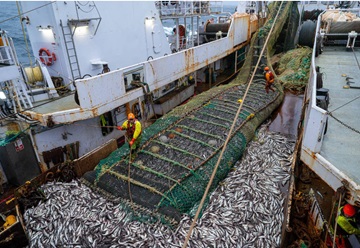 Amid catastrophic shortfalls in salmon harvests in some of Alaska’s rural, Indigenous communities, advocates have pleaded for a crackdown on unintentional catch of those same salmon by the trawl vessels that harvest billions of pounds of whitefish in the Bering Sea. But the politically appointed regional council that manages Bering Sea fisheries has largely resisted those requests. So instead, advocates are now taking another approach. They’re pushing the Biden administration for a workaround: a rewrite of the federal guidelines that tell the regional council, and its counterparts across the country, how to manage all the fisheries under their supervision. >>click to read<< 18:40
Amid catastrophic shortfalls in salmon harvests in some of Alaska’s rural, Indigenous communities, advocates have pleaded for a crackdown on unintentional catch of those same salmon by the trawl vessels that harvest billions of pounds of whitefish in the Bering Sea. But the politically appointed regional council that manages Bering Sea fisheries has largely resisted those requests. So instead, advocates are now taking another approach. They’re pushing the Biden administration for a workaround: a rewrite of the federal guidelines that tell the regional council, and its counterparts across the country, how to manage all the fisheries under their supervision. >>click to read<< 18:40
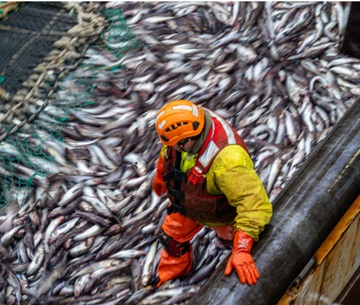
Alaska pollock trawlers are feeling pressure over salmon bycatch, so this reporter went to see for himself
Bering Sea factory trawlers scoop up tens of thousands of pollock at a time, and pressure is intensifying to avoid catching salmon as populations of chum and chinook have plummeted in recent years, causing closures for subsistence harvesting. The trawlers are not entirely to blame, warming oceans due to human-caused climate change are almost certainly a factor, but they have drawn the ire of salmon advocates from Western Alaska to Washington D.C. This is a 341-foot vessel that I went out on, the Northern Hawk, with a crew of 129 people. And most of them work below the deck in a fish factory that, basically when the fishing is reasonable, operates 24 hours a day. Then there are these incredible fillet machines that will fillet 180 fish a minute, and the job of the human is basically to just feed the machine 24 hours a day. And it’s kind of mind-numbing work. Your hands move constantly to make sure the fish are positioned correctly. >>click to read<< 07:40
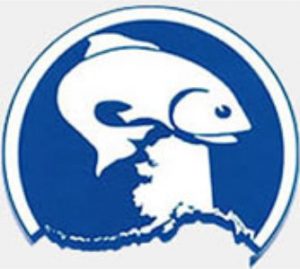
Battlefront: Salmon bycatch, electronic monitoring on the table at Sitka meeting of NPFMC
The bycatch of chinook and chum salmon is on the agenda, as the spring meeting of the North Pacific Management Council gets underway in Sitka this week (June 9-14). In addition to hearing how much salmon is being intercepted in the Gulf of Alaska and Bering Sea by the trawl fisheries, the council will review a proposal to supplement the human observer program with electronic monitoring. >click to read< Note: Find links to the Council’s agenda and meeting livestream here.
Sea lions, Gulf quotas, salmon bycatch top NPFMC agenda
 A final decision is scheduled for Steller sea lion protection measures at the North Pacific Fishery Management Council’s October meeting. The council will meet Oct. 2-8 in Anchorage, with Steller sea lion protections slated to come up Oct. 3. Other items on the agenda are fishing limits for several crab stocks including Bristol Bay red king crab and Bering Sea snow crab, final action on an economic data collection program for Gulf of Alaska trawlers and groundfish harvest specifications. more@alaskajournal Livestreaming information is here 13:31
A final decision is scheduled for Steller sea lion protection measures at the North Pacific Fishery Management Council’s October meeting. The council will meet Oct. 2-8 in Anchorage, with Steller sea lion protections slated to come up Oct. 3. Other items on the agenda are fishing limits for several crab stocks including Bristol Bay red king crab and Bering Sea snow crab, final action on an economic data collection program for Gulf of Alaska trawlers and groundfish harvest specifications. more@alaskajournal Livestreaming information is here 13:31
Time to talk fish – Mary Lochner – Anchorage Press News
Some of the issues at question: Are there unknown reasons for the crash related to the ocean environment, or is salmon bycatch from pollock fisheries to blame? If harvests have to be restricted, who should get first priority for catching the available fish? Which is the best management strategy for maintaining a healthy fishery, and who should get to decide what that is?……Read More.

































